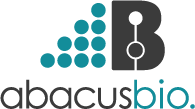
Introducing the Business:
Established in 2001, we operate as a consultancy business in the food and fibre space where our scope spans internationally across agriculture, horticulture, forest trees, and aquaculture. Our strapline, Bridging Science and Business, summarises our purpose. We assist businesses to interpret and utilise scientific information to improve their operations. By combining our science and business expertise we strive to grow our clients’ revenue and profit.
From AbacusBio's four main centres, Dunedin (35 people), Rotorua (3 people), Edinburgh (15 people) and North America (4 people), our consultants work on industry-leading initiatives across the primary food supply chain. With skill sets in genetics, data science, biotechnology, production system development, economics, strategy, and investment we provide broad strategic and technology evaluation services and project management expertise to a range of organisations.
Our expertise in breeding and genetics of livestock, and more recently plants, is strengthened by our focus on the economics of breeding program design and interpretation, and genetic evaluation, and biotechnology. Our clients include seed-stock breeders, breeding companies, organisations providing genetics expertise, developers of genetic evaluation systems and organisations servicing the wider sector.
What the Business needs:
|
Background & Project Ruminal metabolic pathways relevant to methanogenesis: This role is now filled. A considerable amount of effort has gone into identifying the rumen microbes responsible for the degradation of food products. Another approach has been to look at the pathways and then seek to assess the relative importance of various pathways. This project will build on the very successful stoichiometric approach that we applied with an intern on 2022-23. Intern role The intern will take this work further and through literature analysis seek to build hypotheses around the pathways of feed breakdown and carbohydrate metabolism in the rumen, especially in relation to the impact on methanogenesis.
|
|
Background & Project: This role is now filled. Review of the role gene-editing may have in New Zealand: Regulations around gene editing in New Zealand are currently a hot topic of discussion. Opportunities to reduce the environmental impact of New Zealand’s primary industries through gene editing need to be compared with potential loss of market share into premium export niches to inform future political and commercial decision making, and to guide research priorities. Intern role: This project will involve a review of potential gene edit targets of potential relevance in New Zealands primary industries. A comprehensive catalogue of supporting documentation will be assembled and used to categorise putative genetic modification targets according to their potential future impact on New Zealand agriculture and its environmental output.
|
|
Background & Project: This role is now filled. Economics of low emissions: The pace in terms of dealing with the implications of emissions on-farm is increasing rapidly – the newly announced Fonterra initiative (with a focus on emissions intensity - kg CO2e per kg milk solids) is a case in point. How might we deliver a genuinely carbon-neutral dairy farm? Intern role: Build on our economic model of a dairy farm (Farmax) incorporating both efficiency measures and novel approaches to methane mitigation. What would I have to believe to invest in some of these novel approaches? |
For more information about this Business, please contact:
Office Address:
Public Trust Building, 442 Moray Place, Dunedin
Preferred Contact Information:
Cherokee Walters
